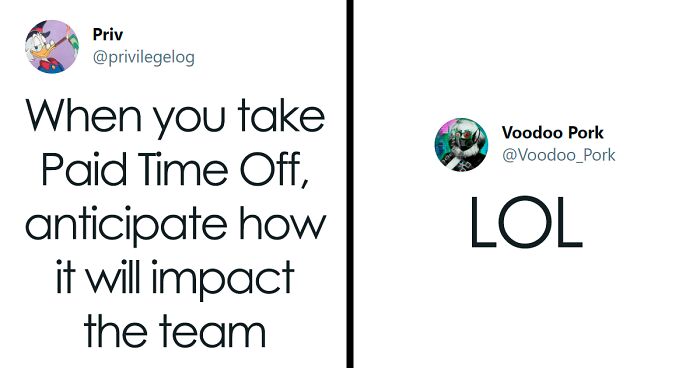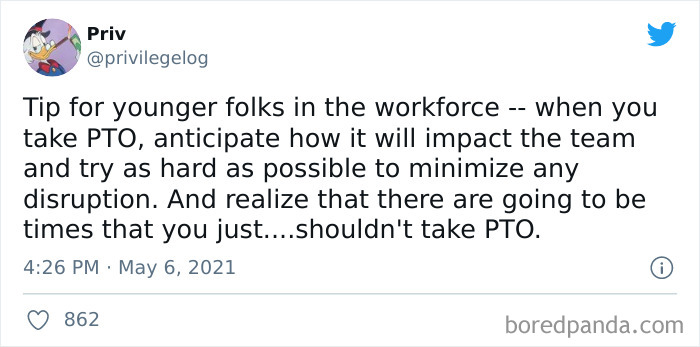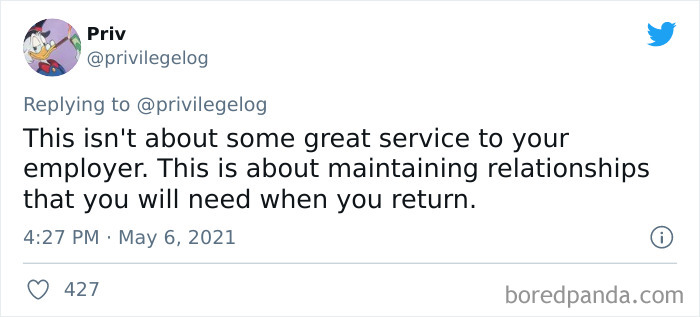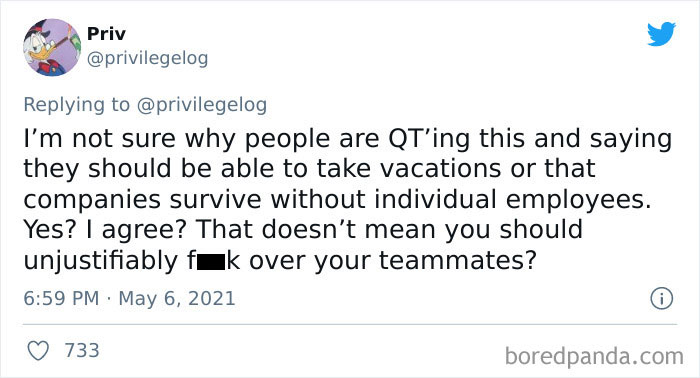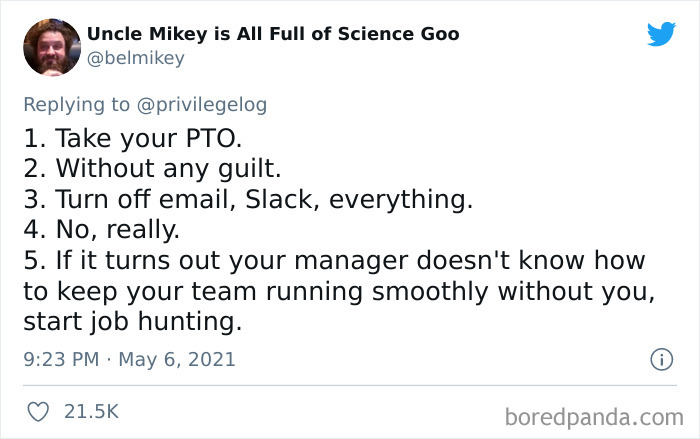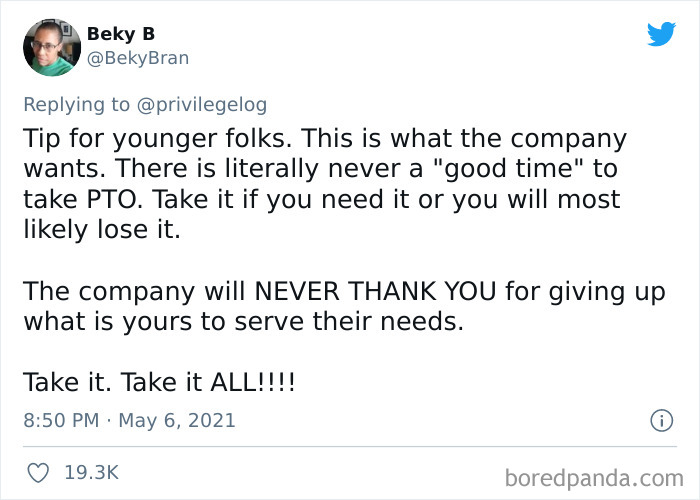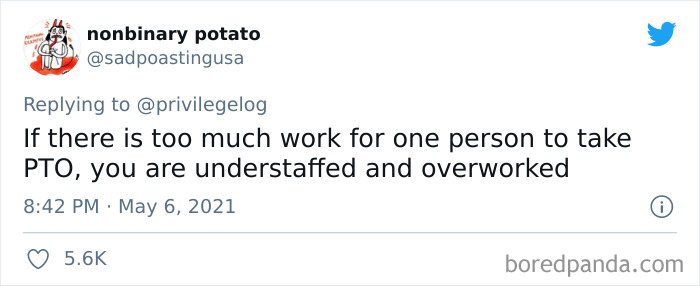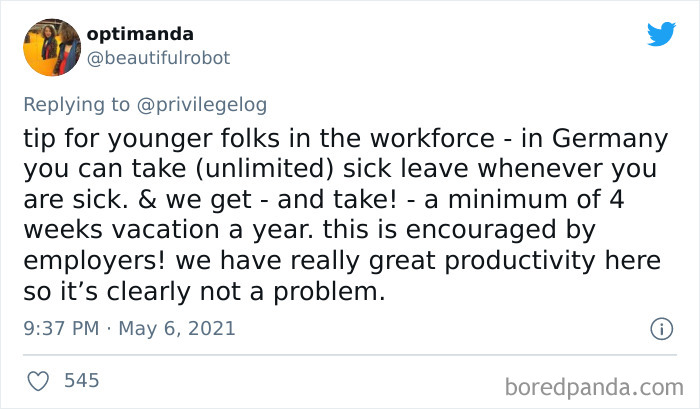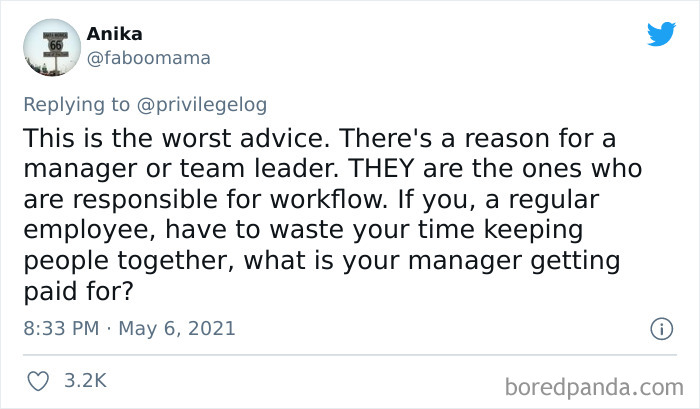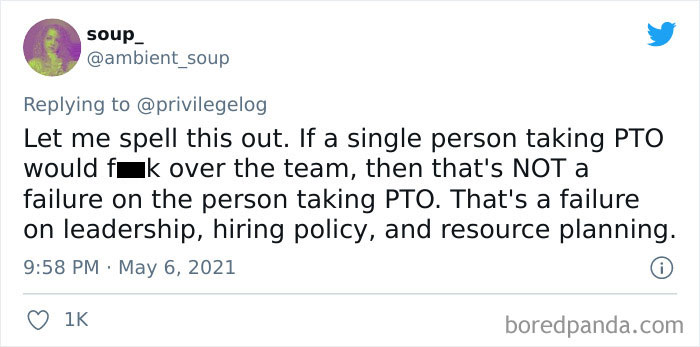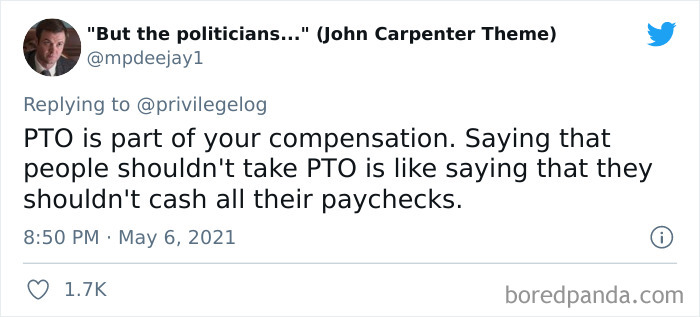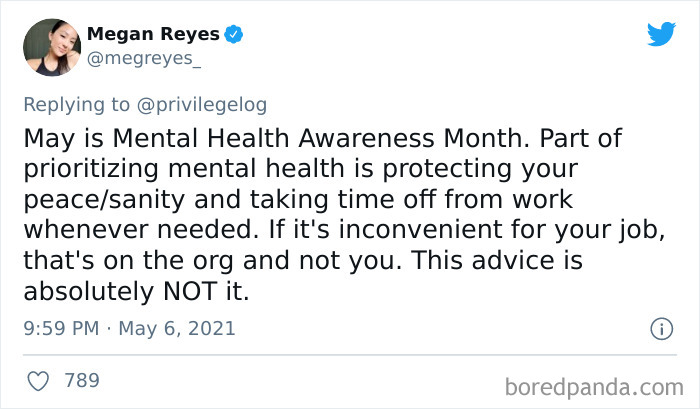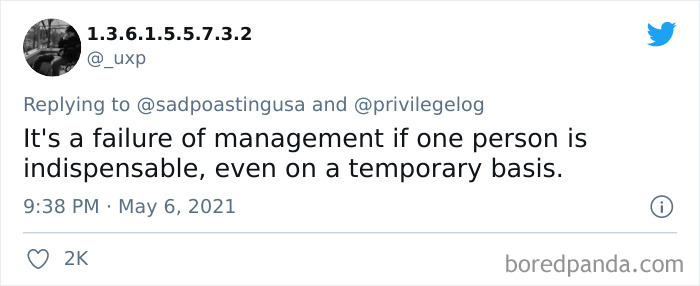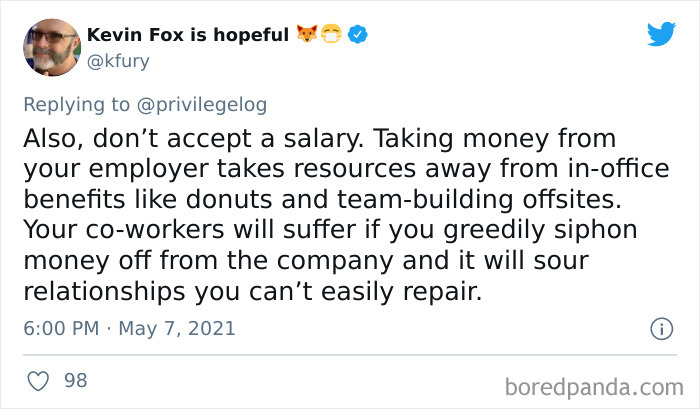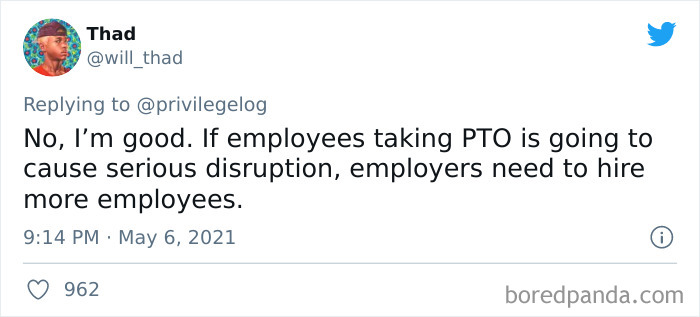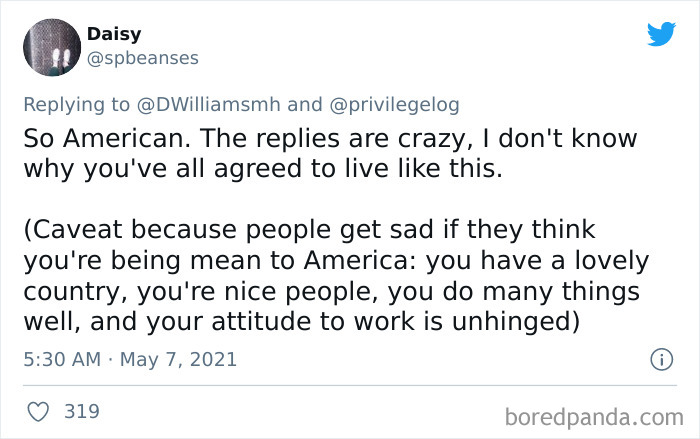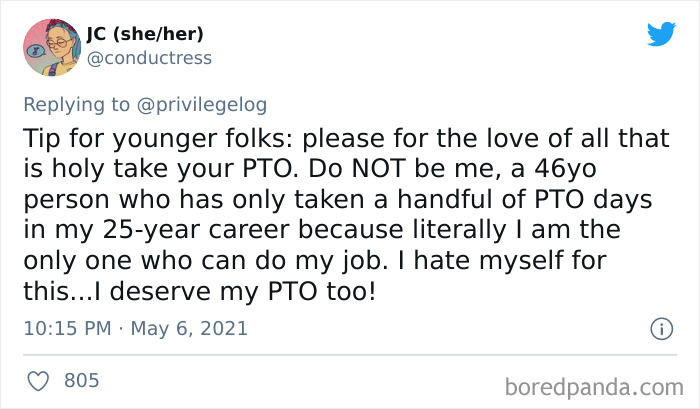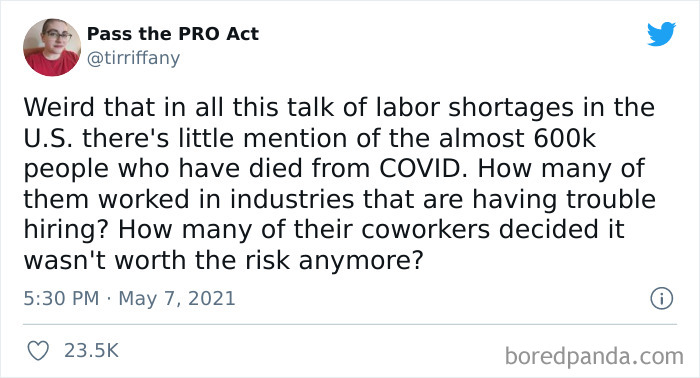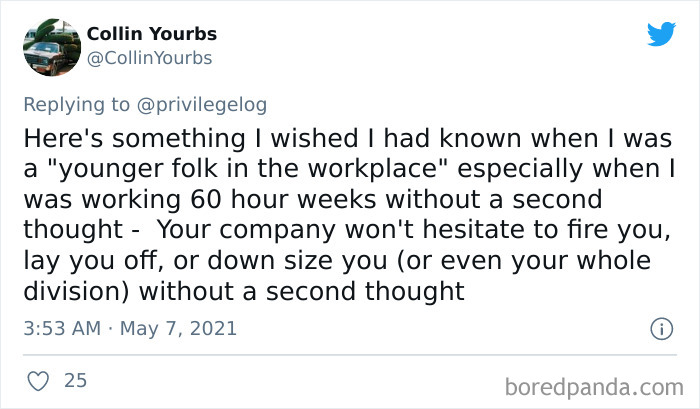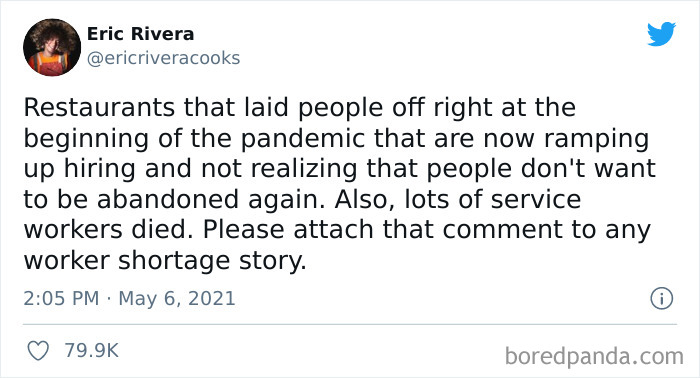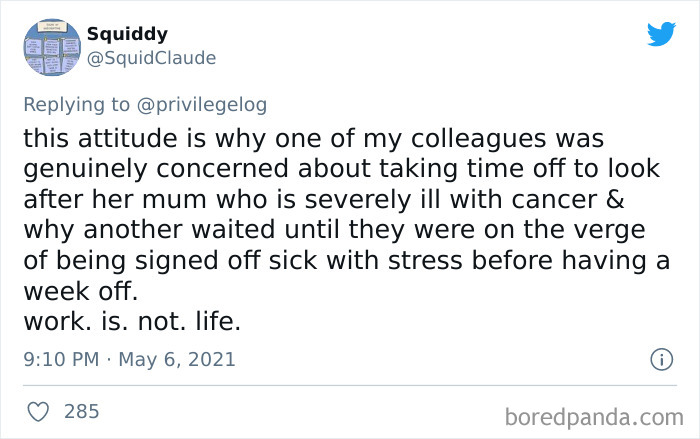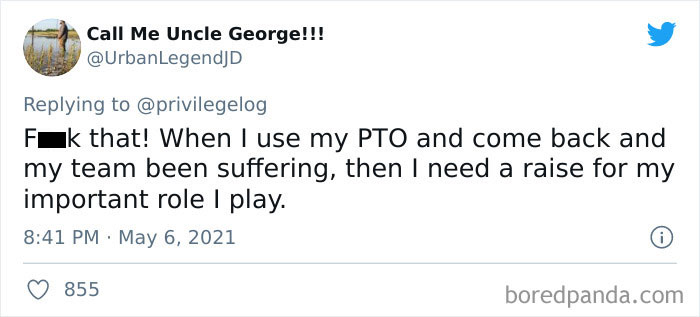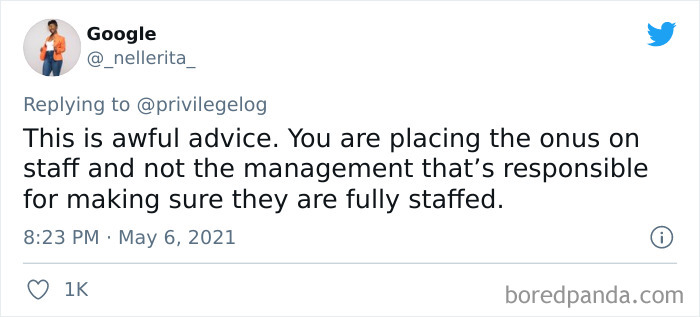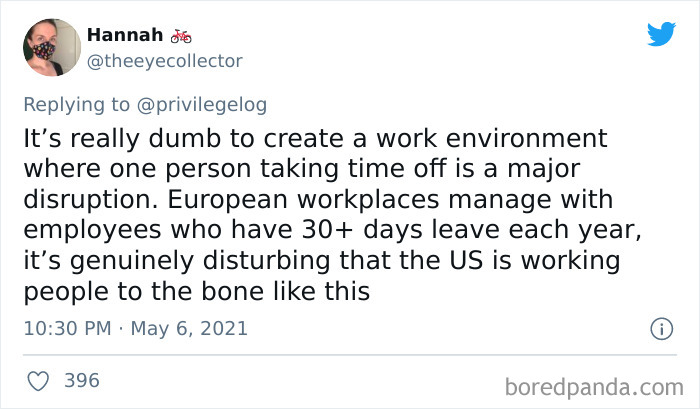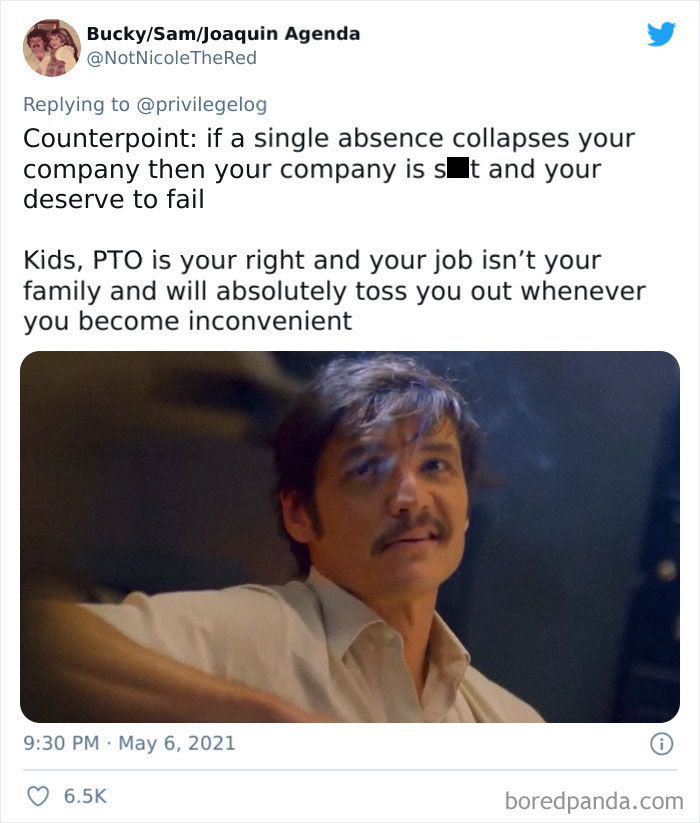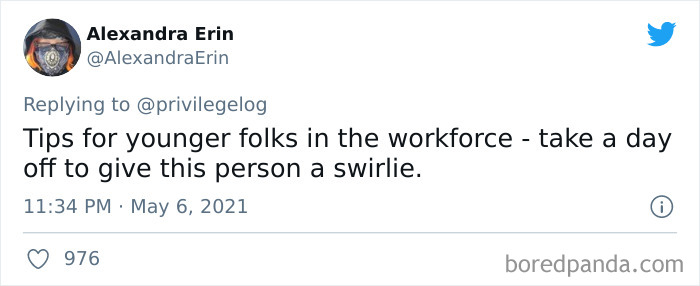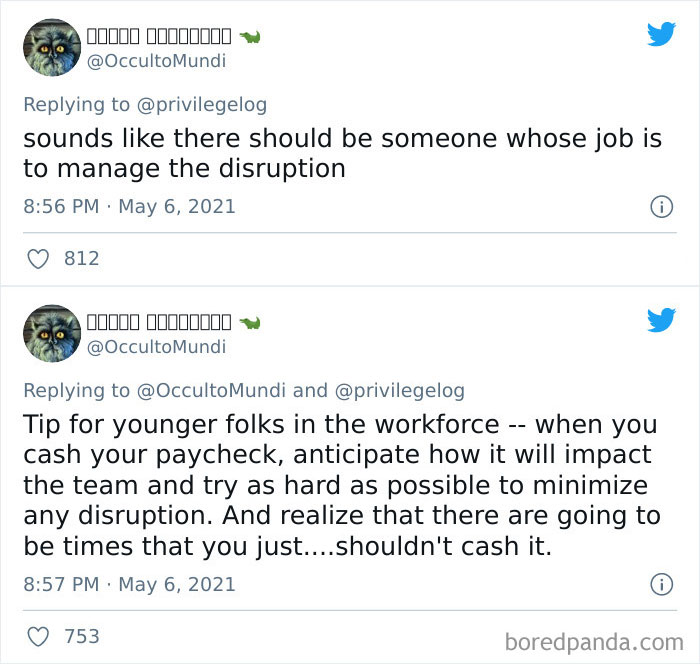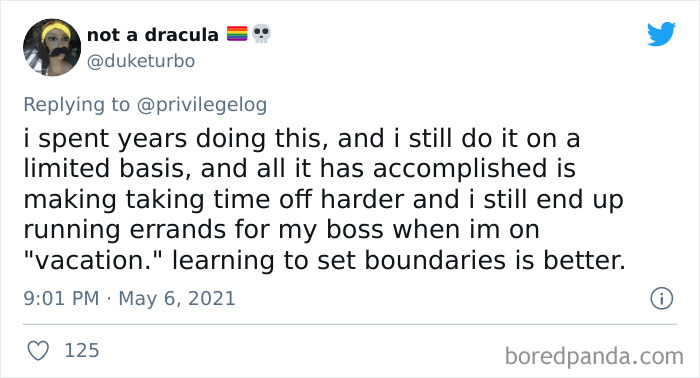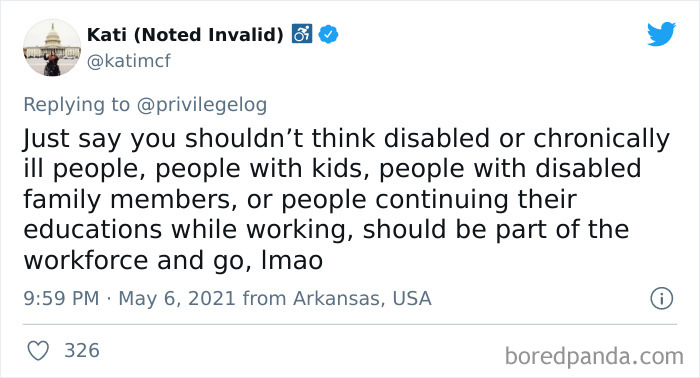According to the Bureau of Labor Statistics, 10 days is the average amount of paid time off for private sector employees who have completed one year of work. But that doesn’t mean that everyone is entitled to them.
The truth is, the country has no national policy guaranteeing workers paid annual leave as it all depends on the private employees. In fact, often 10 public holidays in the US come without pay, which stands as a stark contrast with more than 30 days allotted vacation time to workers in Europe.
Having that in mind, it should be only fair for workers to use their paid time off if they’re lucky enough to be entitled to some. But one Twitter user caused a heated debate with a very questionable “tip for younger folks in the workforce.” @privilegelog has stated that when you take PTO, you should minimize your impact on the team and make sure it won’t cause any disruption. The author went as far as claiming that you gotta face the fact that there are times “you shouldn’t take PTO.”
As you can imagine, the controversial statement caused quite a fair share of backlash on Twitter as many people joined to comment on what’s been dubbed “the worst advice ever.”
This post may include affiliate links.
6. Move to country where it's understood that healthy and well rested workforce is an asset.
I spent way too many years working for an employer who expected me to work while I was deathly ill if I couldn’t cover my shift. I now work for an employer who has told me that my vacation hours were in danger of expiring, so maybe I should take a week off next month, or did I want to leave early every day for the next few weeks instead?
As we’re rolling into the spring, workers across the US are starting to think of getting some well-earned time off. But only a handful of people are able to do so since the federal law does not provide for vacation pay. The Fair Labor Standards Act (FLSA) does not require payment for time not worked, such as vacations, sick time, or holidays. It leaves American employees without entitlement to paid time off from work, which would be unimaginable in the rest of the world.
According to Lonnie Golden, a labor economist at Penn State, American workers tend to say that making more money is a higher priority than having access to more paid time off, unlike in Europe, where workers rate having more time off work as more important than making more money. In general, he argues, “there’s true economic need for money to come first in America, and time second.”
I agree with you zzabeth - (very clever of you) & I'm a boomer.
Moreover, “We shy away from having a national paid vacation standard, while there are more and more low-wage jobs that aren’t covered by private employer policies. And, because of our bias toward work, the salaried people who do have paid vacation, but don’t feel at liberty to use it, wind up leaving it on the table.” This is something that he calls a “perfect storm.”
"If you're indispensable, you're also un-promotable". Start looking for another job.
Meanwhile, an ever-growing body of research has continually shown that taking time off offers fundamental mental and physical benefits. Overall, it offers greater life satisfaction by improving work-life balance, decreasing time pressure, and allowing for better mental health. Experiences on vacation also have long-lasting effects and can even make us see past experiences, although unpleasant, in a different, more positive light.
Not just America. Also applies to public services in UK which are so understaffed and underfunded that we find ourselves thinking like that
So if you took what you deserve they would have to hire someone who can also do it if needed.
That's the first thing my dad told me when I started working!!! " Today you're indispensable because you are working unpaid overtime, tomorrow you're fired for taking your lunch break."
Some people can afford to work to live, other people need to live to work to live.
The team has proven that you're the key to their succes, which needs to be rewarded with a raise and a bonus. In reality you will be written down for a lack of loyalty and work ethos.
Has also to do with the fact that European governments actively fought exploitation by legislating strict labor laws and securing employees rights like pregnancy leave, no randomly firing people without a good reason, safety rules on the job and a maximum of hours someone is allowed to work per week.
He is absolutely right. No matter what your opinions on unions might be the historical fact is that people literally fought and died so that all of us had to right to have days off, and reasonable work week, among other things. We forget that to our peril.
The absolute worse advice...ever. I have been in the IT industry since 1993. My wife has photos of our vacations, with me in the background either on my phone or on my laptop. We are a blended family and have six kids between the two of us. I have missed out on the vast majority of my kid's childhoods. I have missed out on precious time with my family because I was afraid of losing my job at the time. I worked for 4 days while on my honeymoon. Let me just tell everyone.... Your spouse WILL remember that and you will gain nothing from it. I worked for three different companies (one for big pharma) and I was expected to be available 24/7, 365 days a year. I am finally (at 48 years old), working for an awesome company. My manager will force us to take time off if we go too long without a break. In IT, there will always be after-hours work, but he recognizes it and plans for all of us to have our time given back to us. I cannot regain lost time, but I can live now.
Note: this post originally had 58 images. It’s been shortened to the top 30 images based on user votes.
Funny. Thankfully, my boss has the exact opposite attitude. She said that, even if we have "no place to go," and "there's so much going on," we need to take time off to re-charge. She says it's actually a good thing, better for our own mental health, and better for the company. Maybe bragging, but she's a great boss, and this is one of the many reasons why.
That's a great vacation in my eyes, just staying at home. Bliss!
Load More Replies...Two things; 1) it’s more professional and just plain considerate to let your team know when your PTO is coming up, barring unforeseen emergencies of course, and 2) make sure your own part of the project is not only up to date but as complete as possible, maybe even done somewhat ahead if you can, so you’re not holding the whole thing up or making your teammates do your work. However, NEITHER of those things should keep you from taking either your well-earned planned time off, or being able to take unplanned time off to deal with an unexpected emergency. Your job is not, and never should be, your whole life. Because, the very millisecond you retire and walk out the door with your box of stuff, the company will have already forgotten you. If you never took the time to nourish your personal life, relationships, and interests, you leave yourself with potential decades of empty loneliness. At the time in life when you will increasingly come to depend on that reliable support system.
This is true. I don't think the guy was saying not to take any time off ever, just to be considerate of team members. I'm shocked (and will probably get severely voted down) that people had such a negative reaction to this post.
Load More Replies...It makes me realise how badly off workers are in the USA. I'm lucky enough to get 30 days, plus bank holidays, and to work somewhere where we're encouraged to use all our leave. I've worked for firms who expected you to with crazy hours and for junior staff not to take leave. In my experience, the long term damage this approach does to your health and relationships isn't worth it.
Exactly. In m country the mandatory pto set by a law Is 20 days per year, but a lot of conpanies (including the one i work for) offers 25 days per year. And you Are OBLIGATED to use them in said year. We usually write our pto demands into calendar that hangs on the wall, so everybody knows when you plan to be away... It's great system
Load More Replies...Funny. Thankfully, my boss has the exact opposite attitude. She said that, even if we have "no place to go," and "there's so much going on," we need to take time off to re-charge. She says it's actually a good thing, better for our own mental health, and better for the company. Maybe bragging, but she's a great boss, and this is one of the many reasons why.
That's a great vacation in my eyes, just staying at home. Bliss!
Load More Replies...Two things; 1) it’s more professional and just plain considerate to let your team know when your PTO is coming up, barring unforeseen emergencies of course, and 2) make sure your own part of the project is not only up to date but as complete as possible, maybe even done somewhat ahead if you can, so you’re not holding the whole thing up or making your teammates do your work. However, NEITHER of those things should keep you from taking either your well-earned planned time off, or being able to take unplanned time off to deal with an unexpected emergency. Your job is not, and never should be, your whole life. Because, the very millisecond you retire and walk out the door with your box of stuff, the company will have already forgotten you. If you never took the time to nourish your personal life, relationships, and interests, you leave yourself with potential decades of empty loneliness. At the time in life when you will increasingly come to depend on that reliable support system.
This is true. I don't think the guy was saying not to take any time off ever, just to be considerate of team members. I'm shocked (and will probably get severely voted down) that people had such a negative reaction to this post.
Load More Replies...It makes me realise how badly off workers are in the USA. I'm lucky enough to get 30 days, plus bank holidays, and to work somewhere where we're encouraged to use all our leave. I've worked for firms who expected you to with crazy hours and for junior staff not to take leave. In my experience, the long term damage this approach does to your health and relationships isn't worth it.
Exactly. In m country the mandatory pto set by a law Is 20 days per year, but a lot of conpanies (including the one i work for) offers 25 days per year. And you Are OBLIGATED to use them in said year. We usually write our pto demands into calendar that hangs on the wall, so everybody knows when you plan to be away... It's great system
Load More Replies...